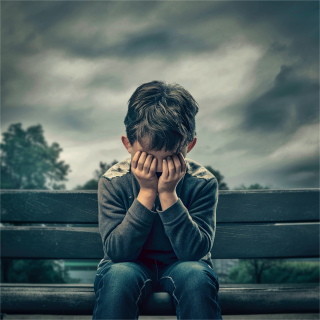Trauma
Adult Children of a Parent with BPD
Having a parent with borderline personality disorder can be a unique form of trauma.
Posted July 22, 2024 Reviewed by Devon Frye
Key points
- Symptoms of BPD can profoundly affect someone's parenting ability.
- Children raised by parents suffering from symptoms of BPD may be exposed to a unique form of trauma.
- Healing from this trauma is often complicated by the parent's tendency to blame the child for what went wrong.
- Parents and other relatives may discourage them from addressing the trauma in an effort to protect the parent.
Many of the defining symptoms of borderline personality disorder (BPD) have a profound effect on someone's ability to parent. In combination and without treatment, these symptoms can produce a traumatic environment for children raised by a parent with BPD.
This form of trauma, when it occurs, differs from classic trauma and presents some unique challenges to healing and growth. Understanding these challenges will help facilitate recovery.

How BPD Can Interfere with Parenting
Healthy parenting involves nurturing a secure attachment with your child by providing stable and consistent interaction. The security, created by consistent tone and demeanor, gives the parent the ability to comfort the child and offers a model of stable attachment that is essential for healthy intimate relationships throughout the lifespan. Secure attachments decrease anxiety by providing the child with an emotional anchor.
The defining symptoms of BPD are unstable (dysregulated) mood, identity, and relationships. These, in turn, are often associated with unstable behavior, often taking the form of impulsivity and aggressive lashing out at others.
A child cannot form a secure attachment to a parent whose behavior is determined by an unstable mood. These children form insecure attachments to their parents which are often fraught with significant anxiety, caused by the child being dependent on a parent whose responsiveness depends on the parent’s mood at any given moment. The parent may be capable of affection and pleasant interaction at times, but when the parent is emotionally dysregulated, the parent can be aggressive and hurtful.
The experience of having an unstable identity makes many BPD sufferers loathe to acknowledge or take responsibility for unwanted outcomes. For this reason, when unwanted outcomes occur, they frequently blame others. The child is traumatized by the parent’s chronically unstable behavior and is blamed for it at the same time.
The following sample dialogue between Emma and her mother illustrates a common exchange. Emma was always anxious at the thought of interacting with her mother. She did her best to keep the peace. Despite her best efforts, her mother treated her hurtfully. Her last exchange with her mother ended calmly, so she was hopeful that the tranquility would sustain. She called her to say hello.
Emma: Hi Mom. How are you?
Mom: Like you care.
Emma: Of course I care! That’s why I called and asked.
Mom: You call when you want. It’s all about you.
Emma: What are you upset with me about?
Mom: Never mind. What do you want?
Emma: I just wanted to say hello and see how you are.
Mom: Well, now you know.
Emma: Yes, but I don’t know why you are upset.
Mom: You're the reason. I wish you were never born.
Emma: Why are you saying these things?
Mom: Because you are ungrateful and never around when I need you.
Emma called her mother in an effort to please her, and her mother lashed out at her without provocation. Emma attempted to discuss this and, her mother, in a few lines, turned it into a conversation about how Emma deserves being lashed out at because she is not a good daughter.
Normalization of Trauma
This type of interaction with her mother was familiar to Emma. Since she was a little girl, her mother subjected her to blame-shifting and gaslighting, as is demonstrated in the above sample dialogue. It was so common and so familiar to Emma, that it became normal to her.
Because this treatment was normalized, Emma did not see it as traumatic. This is a major difference between the trauma experienced by children of parents with symptoms of BPD and conventional trauma.
Victims of conventional trauma are usually (but not always) clear that they have experienced a traumatic event and suffering the effects of having done so. The soldier who returns from combat having nightmares and flashbacks knows they were exposed to trauma. A person who has experienced violent sexual trauma and then suffers sexual dysfunction understands that they have experienced trauma and are suffering effects from it.
Children who experience a parent randomly lashing out at them throughout their childhood, while being gaslighted into believing that it is their fault, generally do not see themselves as trauma victims and thus struggle to heal their trauma. This aspect of the special trauma these individuals experience requires them to begin their healing process by discovering that what they thought was normal—what they treated as normal—was actually allowing them to be traumatized over and over again.
Healing Alone
The healing process for adult children of parents with symptoms of BPD is further complicated by the implications of accepting the idea that they were repeatedly traumatized by their parent. They must stop this process from continuing. They know that their parent, and probably other family members, will be angered by the suggestion that the parent is hurtful.
This tends to be another significant difference from conventional trauma. People who suffer conventional trauma generally—but again, not always—have the support of those around them in recovering from an awful and frightening experience.
Adult children of parents with symptoms of BPD often have to heal on their own. Their parent is angered or even enraged by any suggestion they might have been other than a perfect parent. They discourage or undermine their child’s efforts to heal.
In addition, it is common for these parents to triangulate other family members by portraying themselves as a victim of their child’s accusations. In some cases, other family members may also discourage healing because they understand the attempts to heal as attacks on the parent. They may make comments such as “Why are you hurting your parent? They did the best they could. Let the past be in the past.”
Healing from any kind of trauma is difficult and often painful. The unusual nature of childhood trauma associated with a parent with symptoms of BPD can make healing and growth much harder. Addressing the common obstacles described above could launch you on the road to recovery; soon, you will be a trauma survivor, no longer a trauma victim.
To find a therapist near you, visit the Psychology Today Therapy Directory.




